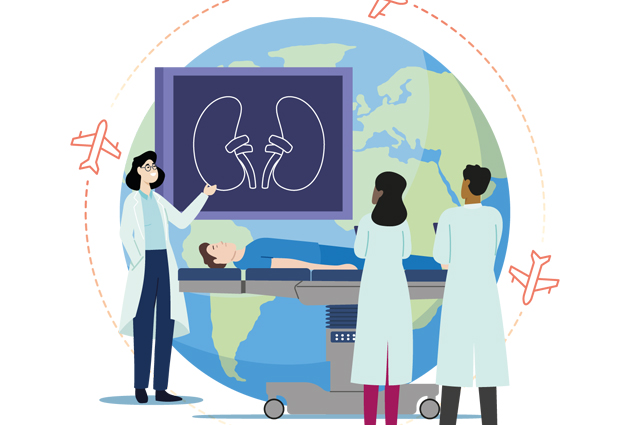Positive to positive
South African surgeon Elmi Muller carried out the first “HIV positive to positive” kidney transplants, giving hope
to the country’s growing number of HIV kidney patients.
As more HIV positive patients are living longer thanks to breakthroughs in treatment, many show signs of other diseases including HIV nephropathy. Up until recently, these patients were not eligible for dialysis in South Africa.
“Physicians also have specific criteria to choose patients suitable for donors,” explains Muller who initiated a transplant program in 2008 for HIV positive patients using HIV positive donors at Cape Town’s Groote Schuur Hospital.
A “purely practical initiative”, she wanted to prove that: “this group of young and working people with an excellent prognosis for therapy were good candidates for transplantation.” As a full time transplant surgeon, Muller knew each donor and was able to see how treat- ment could work.
In South Africa, there is still stigma about HIV, even in the medical field. Muller had a tough job on her hands and encountered op- position as she chose to treat patients who had been turned down. It took a year to set up the program with an ethics committee, policies and procedures.
So far, 30 transplants have been carried out and Muller keeps a close eye on her patients through the clinic she runs. She believes that the right balance of immunosuppressive drugs and keeping infections at bay gives these patients as much chance for survival as any.
To add to this achievement, Muller has been involved in many transplant-related outreach and educational programs for the public and medical profession through the Organ Donor Foundation of South Africa, of which she is the Medical Director.
Recently as an ISN Educational Ambassador she participated in two outreach projects in Zambia and Nigeria, focusing on vascular access. Making contact with local doctor Fiona Ulasi, they are working together on a transplant program in Nigeria. “It is unusual for a surgeon to be part of the EAP [Educational Ambassador Program], for me it was beneficial to interact with surgeons,” she adds. Having regional experts onsite helps to understand the environment and see the needs first hand.
The World Congress of Nephrology will be an opportunity for Dr Muller to share her achievements with the international medical community and stress how transplantation is possible for all.












